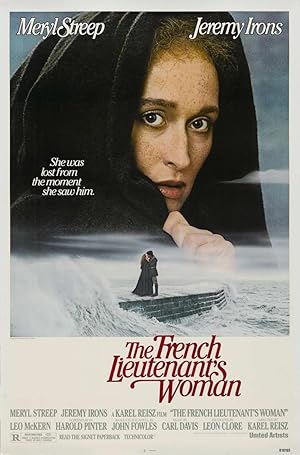
The French Lieutenant's Woman Page #2
- R
- Year:
- 1981
- 124 min
- 594 Views
He is a man she's said to have...
Fallen in love with?
- Worse than that.
- Ah. And he abandoned her.
Is there a child?
I think not.
Oh, it's all gossip.
What's she doing here?
They say she's waiting for him to return.
How banal.
(woman) How has she supported
herself since her dismissal?
(vicar) Most pitifully. I understand...
Miss? Miss?
Miss Woodruff,
would you come in, please?
Mrs Poulteney, this is Miss Woodruff.
I see.
I wish, as the vicar has told you...
...to take a companion.
He has indicated to me that you might be
a suitable person for such a post.
- You are without employment?
- I am, ma'am.
- But you have been a governess?
- I have, ma'am.
The post of companion requires a person
of irreproachable moral character.
- I have my servants to consider.
- (clears throat)
- You speak French, I believe?
- I do, ma'am.
- I do not like the French.
- (clears throat)
Perhaps you might
leave us now, Mr Forsythe.
Yes, of course, Mrs Poulteney.
Good afternoon.
Mr Forsythe informs me that you...
...retain an attachment
to a... foreign person.
I have heard from
the most impeccable witnesses...
...that you're always to be seen
at the same place when you're out.
You stand on the Cobb and look to sea.
I'm led to believe that
you're in a state of repentance...
...but I must emphasise that such
staring out to sea is provocative...
...intolerable... and sinful.
If you consider me unsuitable
for this position...
...do you wish me to leave the house?
- I wish you to show...
...that this person
is expunged from your heart!
- How am I to show it?
- By not exhibiting your shame!
I should like to hear you
read from the Bible.
If your expression is agreeable to me...
...you shall have the position.
- Mike?
- Yeah?
Listen to this.
"In 1857, it is estimated there were 80,000
prostitutes in the county of London."
Yeah?
"Out of every 60 houses,
one was a brothel."
Hoo, hoo, hoo!
"At a time when the male population of
London was one and a quarter million...
...the prostitutes were receiving clients
at a rate of two million per week."
- Two million?
- Yeah.
You know when I say in the graveyard
(helicopter overhead)
"If I went to London,
I know I should become...
...what some already
call me here in Lyme."
- Go on. Yeah?
- Well, that's what she's really faced with.
This man says that
hundreds of the prostitutes...
...were nice girls, like governesses,
who'd lost their jobs.
You offend your boss, you lose
your job, you're out on the streets.
That's the reality.
The male population was
one and a quarter million?
Yeah.
Well, if we take away a third
Translation
Translate and read this script in other languages:
Select another language:
- - Select -
- 简体中文 (Chinese - Simplified)
- 繁體中文 (Chinese - Traditional)
- Español (Spanish)
- Esperanto (Esperanto)
- 日本語 (Japanese)
- Português (Portuguese)
- Deutsch (German)
- العربية (Arabic)
- Français (French)
- Русский (Russian)
- ಕನ್ನಡ (Kannada)
- 한국어 (Korean)
- עברית (Hebrew)
- Gaeilge (Irish)
- Українська (Ukrainian)
- اردو (Urdu)
- Magyar (Hungarian)
- मानक हिन्दी (Hindi)
- Indonesia (Indonesian)
- Italiano (Italian)
- தமிழ் (Tamil)
- Türkçe (Turkish)
- తెలుగు (Telugu)
- ภาษาไทย (Thai)
- Tiếng Việt (Vietnamese)
- Čeština (Czech)
- Polski (Polish)
- Bahasa Indonesia (Indonesian)
- Românește (Romanian)
- Nederlands (Dutch)
- Ελληνικά (Greek)
- Latinum (Latin)
- Svenska (Swedish)
- Dansk (Danish)
- Suomi (Finnish)
- فارسی (Persian)
- ייִדיש (Yiddish)
- հայերեն (Armenian)
- Norsk (Norwegian)
- English (English)
Citation
Use the citation below to add this screenplay to your bibliography:
Style:MLAChicagoAPA
"The French Lieutenant's Woman" Scripts.com. STANDS4 LLC, 2024. Web. 19 Apr. 2024. <https://www.scripts.com/script/the_french_lieutenant's_woman_20264>.


Discuss this script with the community:
Report Comment
We're doing our best to make sure our content is useful, accurate and safe.
If by any chance you spot an inappropriate comment while navigating through our website please use this form to let us know, and we'll take care of it shortly.
Attachment
You need to be logged in to favorite.
Log In